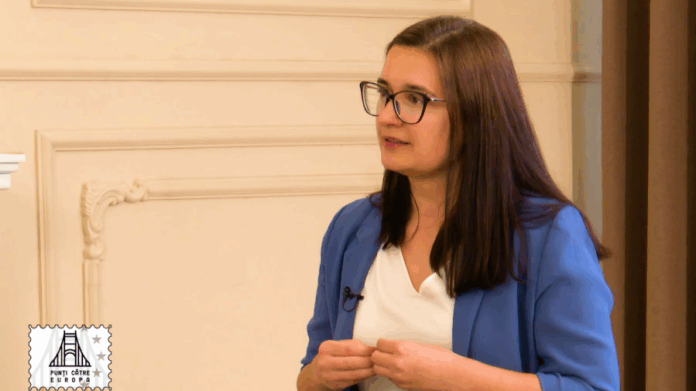Over the past three years, Moldova has made remarkable progress in its European integration journey, thanks to the active engagement of citizens, said Cristina Gherasimov, Moldova’s chief negotiator in Brussels. “Three years felt like thirty,” she noted, marking one year since leading the European Integration Office (BIE). In an interview with journalist Ecaterina Covali, the creator of the project Bridges to Europe, Gherasimov reflected on the challenges, upcoming steps, and when Moldova could become an EU member. RLIVE TV aired the interview on Tuesday, February 4.
“Over the past few years, we’ve truly written a chapter of Moldova’s history. Since March 3, 2022, it feels like we’ve lived through thirty years in just three. That shows the progress we’ve achieved. We are now closer than ever. Today, people recognize Moldova for all the right reasons,” Gherasimov declared.
Gherasimov emphasized that Moldova’s authorities will actively prepare for EU accession over the next five years. By 2030—or possibly by 2029, as recently suggested by EU Enlargement Commissioner Oliver Varhelyi—Moldova must carry out daily reforms: align national legislation with EU laws, ensure fair justice, curb corruption, and strengthen citizens’ rights.
FOR THE MOST IMPORTANT NEWS, FOLLOW US ON TWITTER!
“We’ve completed the first stage of the explanatory screening. European Commission experts walked us through the 33 chapters and hundreds of thousands of pages of EU legislation. We did a great job—we asked questions. Then, in July, we entered the next stage, where we invited the Commission to Chisinau for a screening session. We’ll continue this stage for another year. This bilateral and explanatory screening marks the start of negotiations,” Gherasimov explained.
“We’ve received positive signals from Brussels that Moldova is advanced enough for EU states to open negotiations on Cluster 1. Once Moldova makes sufficient progress across all negotiation stages, it will be officially closed. The European Commission will prepare an evaluation report for member states, confirming Moldova’s readiness to complete negotiations. The EU and Moldova must take the next step by signing the long-awaited accession agreement, and every EU member must ratify it. After that, Moldova will become a full EU member,” she added.
The Bridges to Europe interview was produced with financial support from the Soros Foundation Moldova, in partnership with the Ministry of Foreign Affairs, and implemented by the Association for Responsible Initiatives (ASPIR).


